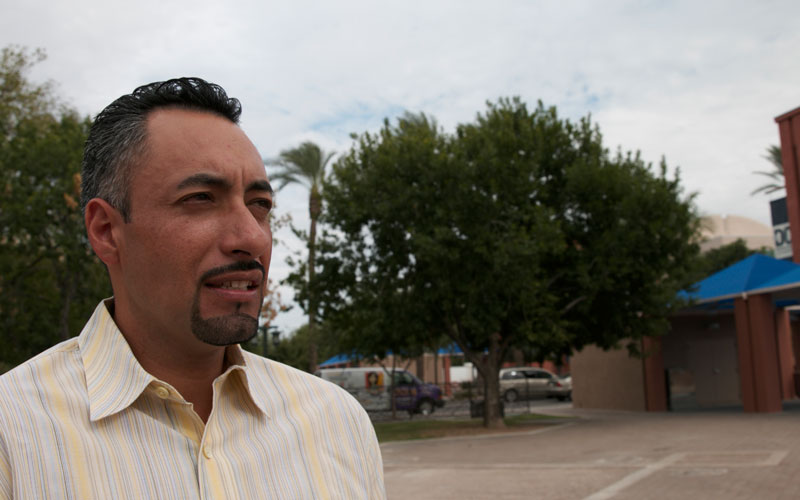
Jose Patiño Regalado, a Chandler landscape worker, waited 21 years to receive a green card that’s a first step toward U.S. citizenship. (Photo by Alicia Clark/Cronkite News)
Jose Patiño Regalado says he’s played by the rules, waiting in line to become a legal immigrant, just as opponents of immigration reform insist. He’s waited 21 years.
“We came to the U.S. so we can have a better life, having more food, having shoes for your kids, having better opportunities in school,” said Patiño, 36, a Chandler landscape worker.
For applicants in Arizona and across the country seeking family visas, the wait can be as long as 25 years to get legal residency through a green card, a requirement to apply for U.S. citizenship.
“We’ve seen cases recently where people have applied for residency in 1994 and they are still waiting to get their visa number to come to the United States,” said Gerald Burns, Patiño’s immigration lawyer. “I think the biggest misconception about immigration is that immigrants don’t want to immigrate legally.”
Opponents disagree.
“It’s no mystery why people come here illegally. They’re acting out of self-interest,” said Ira Mehlmen, national media director and spokesman for Fair, an organization that favors tighter immigration controls.
“I would agree the criteria for selecting people for legal immigration makes no sense,” he said. “It’s based primarily on nepotism. People come here because they have someone here that’s related to them.”
Patiño had no choice. He was a baby when his father left for the U.S. to pick apples and oranges. When he was 10 years old, he joined his father along with his two younger sisters and their mother.
“If I was my dad, I’d make the decision to bring my kids to the U.S. too,” Patiño said.
Ironically, Patiño’s father’s dream of living in the United States legally became a reality when President Ronald Reagan signed the Immigration Reform and Control Act in 1986. The bill, approved by a bipartisan Congress, granted amnesty to 2.7 million undocumented workers.
One million were agricultural workers like his father, Jose Patiño Sr.
The Patiños submitted a family application (I-130 petition) for legal residency status in 1994. But the paperwork was still in limbo when Patiño turned 21.
Children of immigrants who turn 21 must submit their own applications for legal residency as adults. Patiño was part of a backlog applications.
Patiño is considered a “grandfathered alien” due to the petition his parents filed when he was under 21. Even though his family’s application had not yet been processed since his bid was already in, he was eligible to pay $1,000 and potentially gain legal residency status.
If Patiño’s family hadn’t filed a petition on or before April 30, 2001, he wouldn’t have been eligible legal residency today.
“We find that immigrants are extremely resilient people and find a way to immigrate their family members despite the long processing times and heartbreaking separations,” Burns said.
The first step toward U.S. citizenship is getting a visa. In many cases, immigrants must rely on family members who are U.S. citizens or legal residents to sponsor them.
The United States limits the number of those visas to 7 percent per country.
For countries with a lot of immigration, there’s no line to wait in to apply for a visa. Others can wait decades.
The backlog of cases discourages many from applying legally. Others struggle to pay thousands of dollars in application fees for their family.
Applicants pay a filing fee of $985 ($635 for children under 13) per person for the I-485 and an $85 biometrics services fee for applicants between the ages of 14 and 78.
Patiño’s patience paid off. He recently completed the final step in his long journey to become a legal resident: an appointment with an immigration officer, the final step in the application process for legal residency.
He said the long wait has cost him more than time. “It’s tough when you don’t have a Social Security number, but you have big plans,” he said.
Patiño was able to get a work permit that allowed him to support his wife and 9-month-old daughter while he waited to get legal residency.
“I want to get credit and buy a house and use the money I’ve saved to start a business,” he said.
On Sept. 9, after his interview, Patiño became a permanent legal resident, 21 years after he applied.
“We were all so excited we went out to dinner and my mom was crying,” he said.
He hopes to start a landscaping or dry-cleaning business. “I want to give jobs to people who work hard,” Patiño said.
He plans to take the next step and apply to become a U.S. citizen.
The immigration officer who interviewed Patiño was a former refugee.
“His comments to Jose were very supportive in recognizing his sacrifice and patience, ” Burns said.
“Everyone works hard, every person wants to have a good future for his family,” Patiño said.